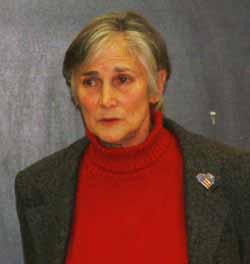A Dissenting Voice: Diane Ravitch Talks About NYC's Newest School Reforms
Calling herself "the most caustic critic in town" when it comes to Mayor Bloomberg's handling of the city's schools, Diane Ravitch-former Professor of History and Education at TC, current Research Professor of Education at NYU-delivered a harsh review of the city's latest school reforms, called for greater openness in the decision-making process, and questioned the value of recruiting business executives to run schools at her recent talk (Feb. 6, 2003), sponsored by the Klingenstein Center.
Ravitch, author of The Great School Wars: New York City, 1805 - 1973, began her lecture by briefly outlining a history of public education in New York City, from its beginnings to the recent disbanding of the Board of Education and the birth of the New York City Department of Education. While she supported the dissolution of the Board of Ed., which she said had presided over "a stasis system, a status-quo system," Ravitch sharply criticized the way the new Dept. of Ed. is being run. She noted that there were no public hearings, nor any public forum, in which parents and other "lay people" could have participated or gained insight into the decision-making process that led to the current reorganization. "As a result, we have no idea how the decisions were made in the development of this new system," she said, adding, "Public education must have a place where the public can be heard…the current administration is operating in total secrecy."
The policy of mandating one specific program each for phonics and math (for all but the city's 200 top-performing schools) came under fire on several fronts. In discussing the two programs-"Month-by-Month Phonics" and "Everyday Math," Ravitch voiced her concerns over the amount of scientific scrutiny the phonics program had received prior to its selection. Ravitch also criticized the lack of flexibility inherent in prescribing a single program, noting that "there is more than one way to teach a subject," and more than one learning style to be found among students. "It would be better if the Chancellor offered a menu of validated programs to choose from," she said.
At the same time, the use of "Month-by-Month Phonics" has found support among members of the city's education community, including TC Professor of English Education Lucy Calkins. Describing "Month-by-Month Phonics" as "pretty traditional," Calkins noted in a separate interview that it is already in use by about one-third of New York's school districts, in high-performing schools as well as those in under-served communities. She added that the phonics program is only one small portion of the city's education initiative, and pointed out that the new Department of Education is providing a lot of backing for balanced literacy and classroom libraries. Compared with other major cities around the country, she said, NYC's teachers are receiving support without having to follow an overly scripted approach.
A memorandum supporting the city's school reorganization and curriculum revision was released on February 7th and circulated among New York City's colleges of education. The memo, addressed to Mayor Bloomberg, Chancellor Joel Klein, and Deputy Chancellor Diana Lam, received 100 signatures within 24 hours of its release, Calkins said. Regarding "Month-by-Month Phonics" the memo states, in part, that "many New York City teachers have experience with the approach and it has a strong track record in both New York City's high-achieving schools and in schools that serve our high-need areas. It is nationally respected, grounded in research-based practices, accessible to teachers, economical, and it has already met with success in other cities, including Phoenix, San Antonio, Cleveland, Albuquerque, and Richmond."
A SCHOOL, NOT A CORPORATION
Ravitch's talk covered a number of contemporary issues, including efforts by many large or troubled districts to recruit school principals from the ranks of business. Having corporate executives train for this role "is not a good fit," she remarked. "I doubt that business leaders are well-qualified to be principals. Could he, or she, recognize a good lesson plan, or know how to provide the right encouragement?" Unlike the way corporations are run, "principals can not simply get rid of students" who under-perform, she said.
In addition to her position at NYU, Ravitch is a member of the National Assessment Governing Board and is the author of an upcoming book, The Language Police: How Pressure Groups Restrict What Students Learn. She holds the Brown Chair in Education Policy at the Brookings Institution (Washington D.C.), and served as Assistant Secretary of Education and Counselor to Secretary of Education Lamar Alexander during the administration of George H. W. Bush.
Published Monday, Mar. 3, 2003

